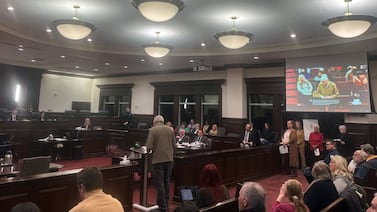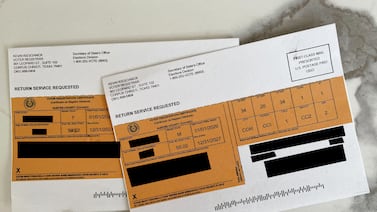Votebeat is a nonprofit news organization reporting on voting access and election administration across the U.S. Sign up for Votebeat Wisconsin’s free newsletter here.
Wisconsin Republicans are reviving a plan to let poll workers process absentee ballots on the Monday before an election, a change long sought by election officials, but blocked by a small but influential group of conservative lawmakers.
This time, the proposal is tied to measures conservatives want, including regulations for ballot drop boxes and an explicit ban on clerks fixing, or curing, errors on ballots. By bundling the measures together, GOP leaders hope to finally unite their party on a plan that would shorten the wait for election results, reduce the opportunity for election misinformation, and avoid a veto by Democratic Gov. Tony Evers.
The proposal, which Votebeat obtained in draft form from Republican Rep. Scott Krug, is set to be publicly released next week. Krug, former chair of the Assembly Elections Committee and now assistant majority leader in the Assembly, said he “will use every little ounce of political capital effort I created on elections to get Monday processing done, because that’s 90% of our problem in the state: perception.”
Early processing of absentee ballots has had support from Democrats and many Republicans, but proposals to allow it have repeatedly stalled in the past due to concerns over whether Milwaukee, a Democratic stronghold that has been a target of election conspiracy theories in the past, could be trusted with the head start on processing ballots.
Krug said he is “confident” that this measure will pass.
“I think the right-leaning voters of the state will appreciate that we’re codifying the court decision that (clerks) can’t cure ballots anymore,” said Krug. “I think the middle and the left-leaning people are going to be able to appreciate the Monday processing, and I think everybody’s going to be able to appreciate that there’s standards for drop boxes — they’re not going away.”
Evers’ team has said he would sign a Monday processing proposal that’s packaged with other measures, as long as they didn’t contain a “poison pill” or make voting harder.
Monday processing proposals have stalled in the past
Most states allow some early processing of absentee ballots, but in Wisconsin, local clerks in Wisconsin cannot begin until the morning of Election Day. That process includes verifying voters’ information, checking for complete witness information, and running the ballots through a tabulator. This proposal would allow everything to begin on Monday, except tallying the results.
In Milwaukee, where absentee ballots numbering between 50,000 to well over 100,000 in general elections are counted in a central location, counting often stretches into the early hours of Wednesday. As those ballots get tabulated in batches overnight, they can swing who is ahead in the vote tallies broadcast by the media, fueling false claims of fraudulent “ballot dumps.”
Democrats have long asked for a bill that includes only the Monday processing proposal, but Krug told Votebeat it’s unlikely that enough Republicans would get behind such a measure for it to pass. Evers himself has proposed “clean” versions of the Monday-processing bill in past state budgets, but ran into Republican opposition.
In 2023, the Assembly quickly approved a version of a Monday processing bill, only for it to stall in the Senate after Republican Rep. Janel Brandtjen, a former elections committee chair who has spread election conspiracy theories, testified against it.
“Why would we give bad actors an extra day to cheat?” Brandtjen said in a statement in 2022 criticizing the transparency of Milwaukee’s election operation. (Claims of widespread voter fraud have never been substantiated.)
What’s included in the current Monday processing proposal
The current proposal is similar to past versions, and includes previously proposed measures to create a centralized database of Wisconsin residents deemed incompetent to vote and to eliminate an obsolete practice of counting absentee ballots.
This version also proposes eliminating a law to record unique ID numbers on the back of absentee ballots at central counting facilities — a requirement that election workers say can risk ballot secrecy and creates needless work. It also includes a provision that would standardize witness address requirements on absentee ballot envelopes.
The proposal would require municipalities that count absentee ballots at a central location to begin processing them on Monday; it would allow municipalities that count them at polling places — such as Madison and the vast majority of other municipalities — to start on Monday, too, as long as they pass an ordinance allowing it.
An extra day to process ballots would allow election officials to work shorter shifts and get the job done more efficiently, said Rock County Clerk Lisa Tollefson, a Democrat.
It could also give election observers, some of whom are skeptical of the voting process, more opportunity to observe both ballot casting and counting, she said.
Tollefson said she was “hopeful” that the bill will finally cross the finish line this session.
“I really would like to have a large municipality have the option to use this, especially for your April and your November elections,” she said. “Those are really long days.”
Why Monday processing could break through this year
Krug said the proposal is one of his top priorities this session. And enough elements might have lined up for it to finally head to the governor’s desk.
Krug’s new leadership role could help. As assistant majority leader, he brokers support within the GOP caucus, which can only afford four defections in the 99-seat Assembly. He said he’s been building support for colleagues’ priorities to get more votes for Monday processing. He also is no longer chair of the elections committee, freeing him to author bills and advance them directly.
Ballot drop boxes may prove to be a key bargaining chip. The conservative-led state Supreme Court banned them in 2022; the liberal-led court reinstated them in 2024 but left them unregulated in statute.
Krug said he helped work on a poll in April that found 76% of Wisconsinites support the Monday processing proposal and 80% support standardized rules for absentee ballot drop boxes.
He decided to put the provisions together, proposing requirements for drop boxes, including where to place them, how to secure them, how to collect ballots, and how to keep records of when they’re emptied. He also proposed a requirement for the drop box to be under a continuous, livestreamed video feed.
Some members of the Republican caucus, Krug said, still want to get rid of drop boxes entirely. So “we had to kind of beef up the requirements for drop boxes to meet their hurdle. We’re not allowing them, we’re codifying them.”
Alexander Shur is a reporter for Votebeat based in Wisconsin. Contact Alexander at ashur@votebeat.org.


